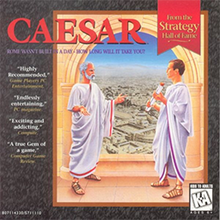
SimCity is a city-building simulation video game developed by Will Wright, and released for several platforms from 1989 to 1991. SimCity features two-dimensional graphics and an overhead perspective. The game's objective is to create a city, develop residential and industrial areas, build infrastructure, and collect taxes for further city development. Importance is placed on increasing the population's standard of living, maintaining a balance between the different sectors, and monitoring the region's environmental situations to prevent the settlement from declining and going bankrupt.
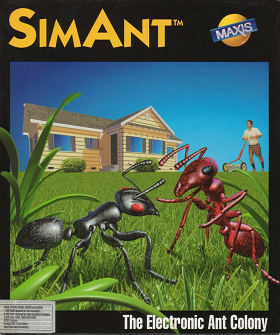
SimAnt: The Electronic Ant Colony is a 1991 life simulation video game by Maxis and the company's third product, focusing on the lifecycle of ants. It was designed by Will Wright. In 1992, it was named "Best Simulation Game" at the Software Publishers Association's Codie awards. SimAnt was re-released in 1993 as part of the SimClassics Volume 1 compilation alongside SimCity Classic and SimLife for MS-DOS, Mac and Amiga. In 1996, SimAnt, alongside several of Maxis' simulation games were re-released under the Maxis Collector Series with greater compatibility with Windows 95 and differing box art, including the addition of Classics beneath the title.
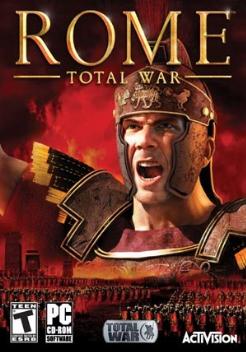
Rome: Total War is a strategy video game developed by The Creative Assembly and originally published by Activision; its publishing rights have since passed to Sega. The game was released for Microsoft Windows in 2004. The Mac OS X version was released on February 5, 2010, by Feral Interactive, who also released the iPad version on November 10, 2016, the iPhone version on August 23, 2018, and the Android version on December 19, 2018. The game is the third title in The Creative Assembly's Total War series, following Shogun: Total War, and Medieval: Total War.
Impressions Games was a British video game developer founded by David Lester. He sold the company to Sierra On-Line in 1995, who was then bought out by Cendant and eventually, Vivendi Universal.
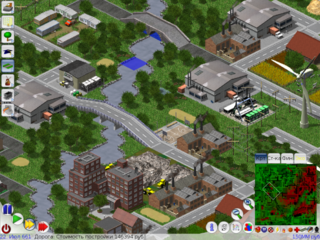
A city-building game, or town-building game, is a genre of simulation video game where players act as the overall planner and leader of a city or town, looking down on it from above, and being responsible for its growth and management strategy. Players choose building placement and city management features such as salaries and work priorities, and the city develops accordingly.

Caesar III is a city-building game released on September 30, 1998, for Microsoft Windows and Mac OS, developed by Impressions Games and published by Sierra On-Line. It is the third installment of the Caesar series of games and is part of Sierra's City Building series. Players assume the role of a provincial governor to build thriving cities across the Roman Empire, in which they must ensure their citizens have their needs met, and deal with various disasters, angry gods and hostile enemies. The developers of Caesar III designed the game in response to critiques of its predecessor, introducing branching missions, a merged map for city-building and combat, and a "walker" mechanic for citizens of the city to affect their surroundings. Caesar III was released to positive critical reception, with praise directed at the game's visual presentation and complex design, and criticism levelled at its military features.

King's Quest VI: Heir Today, Gone Tomorrow is a point-and-click adventure game, first released in 1992 as the sixth installment in the King's Quest series produced by Sierra On-Line. Written by Roberta Williams and Jane Jensen, King's Quest VI is widely recognized as the high point in the series for its landmark 3D graphic introduction movie and professional voice acting. King's Quest VI was programmed in Sierra's Creative Interpreter and was the last King's Quest game to be released on floppy disk. A CD-ROM version of the game was released in 1993, including more character voices, a slightly different opening movie and more detailed artwork and animation.

I-War is a space combat simulator developed by Particle Systems and published by Infogrames. The game was first published in November 1997 in Europe, and in late August of 1998 in North America.

Lords of the Realm is a turn-based strategy computer game published and developed by Impressions Games. It was first released on June 15, 1994, and is the first game in the Lords of the Realm series.
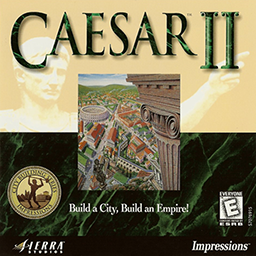
Caesar II is a 1995 video game of the Caesar video game series that takes place in Ancient Rome. It is the second game in the City Building series.

Carrier Command is a 1988 video game published by Rainbird for the Amiga, Atari ST, IBM PC compatibles, ZX Spectrum, Macintosh, Commodore 64, and Amstrad CPC. Carrier Command is a cross between a vehicle simulation game and a real-time strategy game where players control a robotic aircraft carrier.
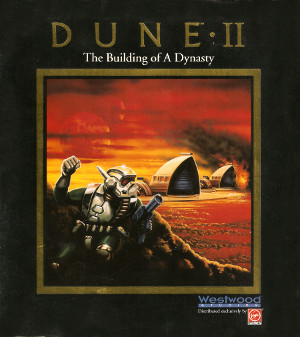
Dune II: The Building of a Dynasty is a 1992 real-time strategy game developed by Westwood Studios and published by Virgin Games. It serves as the sequel to Dune, which came out earlier that same year.

Pharaoh is an isometric city-building game released in November 1999. It was created by Impressions Games and published by Sierra Studios for Microsoft Windows. Using the same game engine and principles of Caesar III, it is the first such game in Sierra's City Building series to focus on another civilization of ancient times. Players oversee the construction and management of cities and settlements in Ancient Egypt, micro-managing every aspect of the city to ensure citizens are fed, employed, healthy and protected from diseases, disasters and wars. An expansion pack, Cleopatra: Queen of the Nile, was released in 2000, developed by BreakAway Games. In 2001, both the game and expansion pack were bundled together as Pharaoh Gold. A remake titled Pharaoh: A New Era was released by Triskell Interactive and Dotemu in 2023.

Caesar IV is a city-building game set in ancient Rome, developed by Tilted Mill Entertainment and published by Sierra Entertainment. The game was released on September 26, 2006, in North America. The game features a three-dimensional game engine and individual modeling of game character behaviors.

Populous II: Trials of the Olympian Gods is a 1991 strategy video game in the Populous series for the Amiga, Atari ST and MS-DOS-based computers, developed by Bullfrog Productions. Populous II is a direct sequel to Bullfrog's earlier game Populous and is one of the company's most notable games.

Centurion: Defender of Rome is a turn-based strategy video game with real-time battle sequences, designed by Kellyn Beck and Bits of Magic and published by Electronic Arts. Originally released for MS-DOS in 1990, the game was later ported to the Amiga and the Sega Genesis in 1991. Centurion shares much of the concept and feel with Beck's earlier game Defender of the Crown (1987).

Empire is a 1977 turn-based wargame with simple rules. The game was conceived by Walter Bright starting in 1971, based on various war films and board games, notably Battle of Britain and Risk. The game was ported to many platforms in the 1970s and 1980s. Several commercial versions were also released such as Empire: Wargame of the Century, often adding basic graphics to the originally text-based user interface.
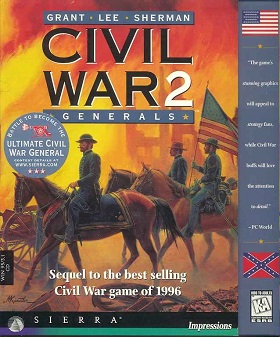
Grant, Lee, Sherman: Civil War Generals 2 is a computer game published by Sierra On-Line in 1997. It is the sequel to Robert E. Lee: Civil War General.

Grand Ages: Rome is a 2009 city-building and real-time strategy game developed by Haemimont Games and published by Kalypso Media. It is the sequel to 2008's Imperium Romanum. The Italian and Spanish versions of the game are titled as Imperivm: Civitas III. A sequel, Grand Ages: Medieval, was released on September 25, 2015.
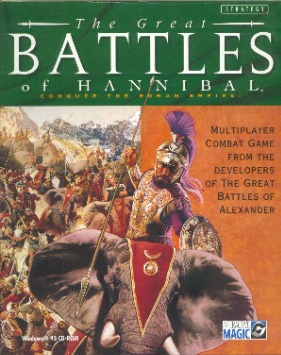
The Great Battles of Hannibal is a 1997 computer wargame developed by Erudite Software and published by Interactive Magic. Based on the board wargame SPQR, it is the sequel to The Great Battles of Alexander and the second game in the Great Battles computer wargame series.
